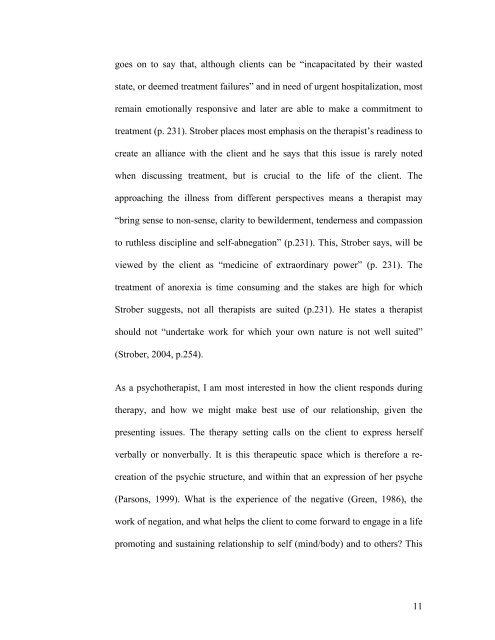“Ghosts at the banquet” - Scholarly Commons Home
“Ghosts at the banquet” - Scholarly Commons Home
“Ghosts at the banquet” - Scholarly Commons Home
You also want an ePaper? Increase the reach of your titles
YUMPU automatically turns print PDFs into web optimized ePapers that Google loves.
goes on to say th<strong>at</strong>, although clients can be “incapacit<strong>at</strong>ed by <strong>the</strong>ir wasted<br />
st<strong>at</strong>e, or deemed tre<strong>at</strong>ment failures” and in need of urgent hospitaliz<strong>at</strong>ion, most<br />
remain emotionally responsive and l<strong>at</strong>er are able to make a commitment to<br />
tre<strong>at</strong>ment (p. 231). Strober places most emphasis on <strong>the</strong> <strong>the</strong>rapist’s readiness to<br />
cre<strong>at</strong>e an alliance with <strong>the</strong> client and he says th<strong>at</strong> this issue is rarely noted<br />
when discussing tre<strong>at</strong>ment, but is crucial to <strong>the</strong> life of <strong>the</strong> client. The<br />
approaching <strong>the</strong> illness from different perspectives means a <strong>the</strong>rapist may<br />
“bring sense to non-sense, clarity to bewilderment, tenderness and compassion<br />
to ruthless discipline and self-abneg<strong>at</strong>ion” (p.231). This, Strober says, will be<br />
viewed by <strong>the</strong> client as “medicine of extraordinary power” (p. 231). The<br />
tre<strong>at</strong>ment of anorexia is time consuming and <strong>the</strong> stakes are high for which<br />
Strober suggests, not all <strong>the</strong>rapists are suited (p.231). He st<strong>at</strong>es a <strong>the</strong>rapist<br />
should not “undertake work for which your own n<strong>at</strong>ure is not well suited”<br />
(Strober, 2004, p.254).<br />
As a psycho<strong>the</strong>rapist, I am most interested in how <strong>the</strong> client responds during<br />
<strong>the</strong>rapy, and how we might make best use of our rel<strong>at</strong>ionship, given <strong>the</strong><br />
presenting issues. The <strong>the</strong>rapy setting calls on <strong>the</strong> client to express herself<br />
verbally or nonverbally. It is this <strong>the</strong>rapeutic space which is <strong>the</strong>refore a re-<br />
cre<strong>at</strong>ion of <strong>the</strong> psychic structure, and within th<strong>at</strong> an expression of her psyche<br />
(Parsons, 1999). Wh<strong>at</strong> is <strong>the</strong> experience of <strong>the</strong> neg<strong>at</strong>ive (Green, 1986), <strong>the</strong><br />
work of neg<strong>at</strong>ion, and wh<strong>at</strong> helps <strong>the</strong> client to come forward to engage in a life<br />
promoting and sustaining rel<strong>at</strong>ionship to self (mind/body) and to o<strong>the</strong>rs? This<br />
11
















